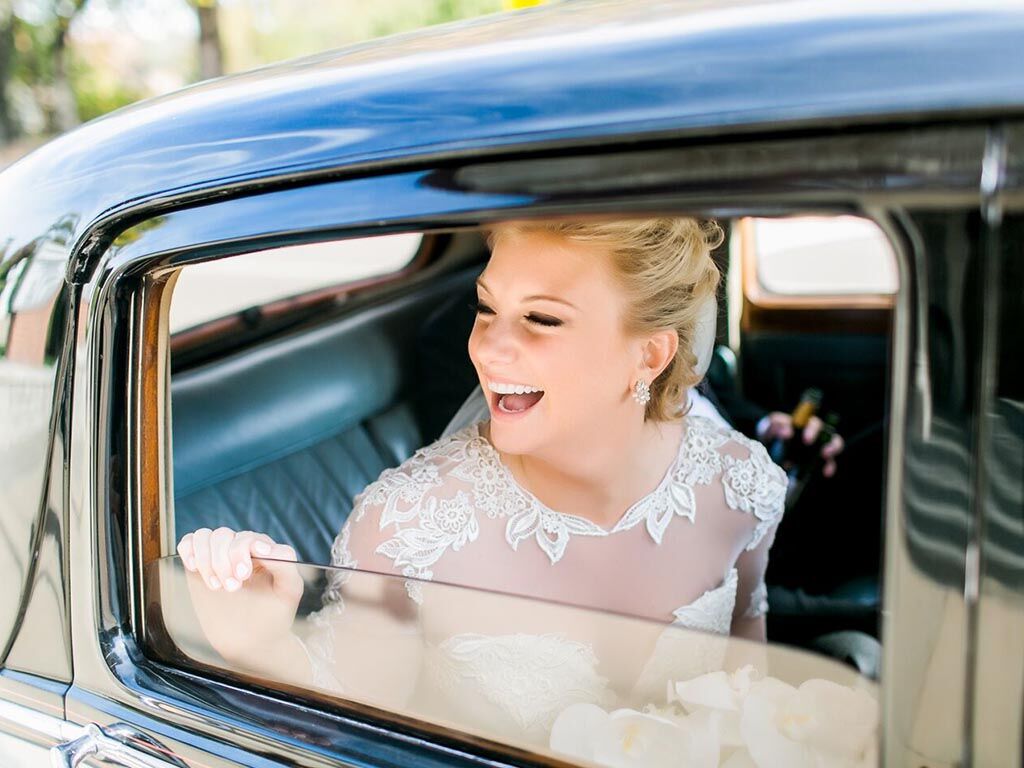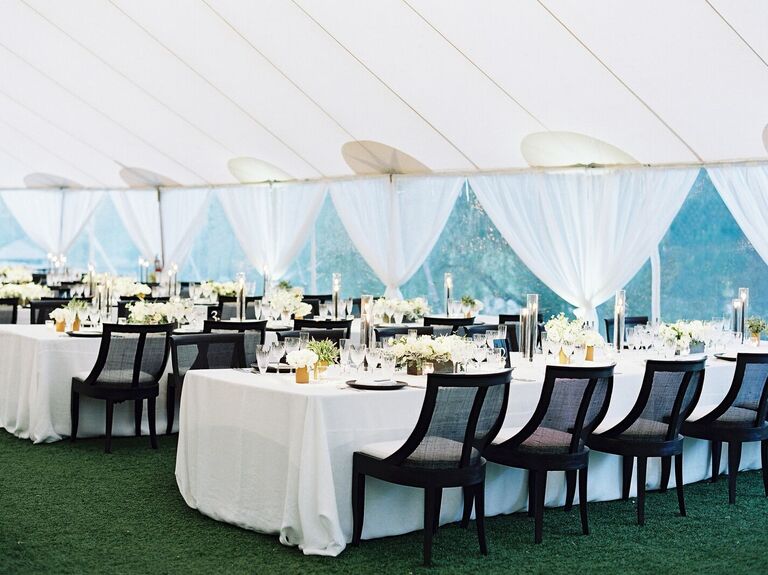Outdoor Wedding? Yes, You Actually Need a Backup Plan
If you're dreaming of saying "I do" surrounded by fresh air and nature, you're not alone. According to The Knot's Real Wedding Study, 58% of couples hosted an outdoor wedding ceremony. But while getting married under blue skies may be the dream, quite often rain showers or chilly, windy weather is the reality. You could skip the whole idea and run for cover, choosing an indoor venue from the jump. Or you could plan for the outdoor wedding you've always wanted at a setting like a beach or garden (check out The Knot Marketplace for even more venue options), but keep a rain plan waiting in the wings if the weather doesn't cooperate.
"It's always good to have a plan B no matter what time of the year it is or where your wedding will take place," says Hallea Tse of Hallea Events in Seattle, Washington. "In Washington where my team primarily hosts events, we think about a rain plan, wind plan (for certain regions), heat plan and smoke plan. Generally speaking, if your venue has an indoor option, it's a great Plan B to fall back on! There will always likely be unforeseen hiccups on the wedding day so my best advice is to have a strong vendor team who you can trust to advocate for you on the day-of."
Here's some more advice on how to create an outdoor wedding rain plan so you can hope for a sunny day, but prepare for anything Mother Nature throws your way.
1. Hire a planner.
A wedding planner has many responsibilities, but one of the most important is helping you come up with a rain plan for an outdoor event. They'll make sure you have a solid Plan B in place, and then, as your wedding-day forecast comes into focus, help you decide whether or not you'll need to put your backup plan in motion. "Your planner is the one who can steer the ship when it comes to making back up plans and executing them," says Tse.
2. Start planning early.
You'll need to start thinking about a rain plan earlier than you might think—like, before you even choose a wedding venue. When touring venues with outdoor space, ask the venue coordinator to walk you through the rain plan—some venues may have an indoor or covered option at the ready, while others may require you to bring in a tent (more on that in a minute). "When we're touring venues couples should see Plan A and Plan B to again ensure they love both options from the start," says Jessyca Canal of EBJ Events in Miami, Florida. If you're truly unhappy with a venue's rain plan, it might not be the right space for you.
3. Try an indoor and outdoor plan.
Some venues, such as golf courses and hotels, have indoor options for your wedding should the weather not cooperate. It might cost extra to reserve an extra space, but if it means keeping you and your guests dry and warm, then it's well worth it.
The good news is that backup plans aren't all or nothing. If looming rain isn't forecasted to fall until late into the evening, a backup space means you can still take advantage of clearer skies, holding a portion of your event outdoors, such as your ceremony and cocktail hour, and then move the dinner and dancing inside when wet weather strikes.
4. Reserve a tent.
One common backup option is to put up a tent on the grounds, giving you outdoor surroundings with plenty of coverage from the elements. To go this route, check with the venue to make sure a tent is allowed on the property, and whether or not you need to work with a specific vendor.
"We love a tent!" says Tse. "They do involve a lot of logistical handling if you are bringing one on site when there normally isn't one—I highly suggest having your planner, venue and rental company take charge of this piece if you can."
If a tent is part of your backup plan, your safest bet is reserving a tent around the same time as booking your venue. "Our rental company that we partner with does allow us to reserve a tent with a deposit," adds Tse. "In our case, we can also reserve a tent as late as a few weeks out from the event date—you do play a risk with this option of course! Every rental company will have different stipulations for reserving tents so I would encourage you to reach out and ask."



While a tent might not be quite what you had in mind, it can be a versatile option acting as a blank canvas to meet your theme and achieve the outside vibe you want. Tents also come with clear side and top panels, allowing for unobstructed, breathtaking views.
5. Set aside a bad-weather fund.
If your outdoor wedding rain plan includes a tent or other additional expenses, you'll want to be sure to include it in your wedding budget—even if you're not sure whether or not you'll actually go through with it. According to Tse, tents can cost anywhere from thousands to tens of thousands of dollars. "As a person who evaluates risk daily, I would say having a discretionary fund set aside is a good idea and leaning on your planner to help you evaluate that risk is going to be key," she says.
6. Make the call.
As soon as the 10-day forecast comes into view, you'll likely start obsessively checking your weather app of choice. As your wedding day nears, you'll need to make a call on whether or not to stick with your outdoor plan or move to Plan B—with the help of your wedding planner, venue coordinator and other vendors. If your pros suggest moving with Plan B, prioritize the comfort and safety of your guests over your desire for pretty outdoor ceremony pics.
"Listen to your wedding planner on this one," says Canal, who has nearly a decade of experience in the wedding industry. "They see these situations all the time so if they suggest something, it's for a reason. I once had a couple who wanted too long because they were in denial and didn't want to make the decision, and the day was ruined. I no longer allow my couples to wait because that was a terrible experience for everyone involved."
7. Loop in your vendor team.
If you're moving forward with your outdoor wedding rain plan, you'll need to notify the rest of your vendors so that everyone is in the loop. "When you decide to switch any plans that have an effect on your floor plan layout (i.e. the ceremony was previously on the lawn and now it is being moved inside), you should tell any vendor who will be affected by this," says Tse. "If your backup plan does not change your floor plan layout, you'll want to tell the vendors who may have any extra set up because of the change in plans."
8. Consider weather-related giveaways.
Yes, a rainy wedding day may be a bummer, but it can also be an opportunity to add personality to your event. Umbrellas make great giveaways, rain boots add a pop of color to your wedding-day look, and cozy throw blankets are perfect for snuggling. Rain can be super-romantic (hello, The Notebook!) so embrace it.
9. Roll with the weather.
We all know that Mother Nature can be unpredictable, and in many parts of the country, showers can pop up at any time. Flexibility is key here, as you may need to shift the timing of your ceremony a bit to accommodate a passing shower, or even move forward with an outdoor ceremony in light rain (as long as your vendors are comfortable with it—and your DJ or live musicians are covered so their equipment and instruments aren't damaged).
This is where you'll really have to lean on your vendors. "We had one wedding where the weather was so unpredictable that we had to move the ceremony location three times and the reception location twice—in the span of four hours!" says Tse. "It really does take a village to work together and make new plans work - I highly encourage not taking on all of the stress on your own and to work together."
10. Buy insurance.
Predicting the weather is difficult to do, even for professional meteorologists. Backup plans are a must, but added protection is good to have too, in the form of wedding insurance. If parts of your wedding are unable to occur due to wild weather (it's very unlikely but it happens), you may be able to recoup some of the costs.





















